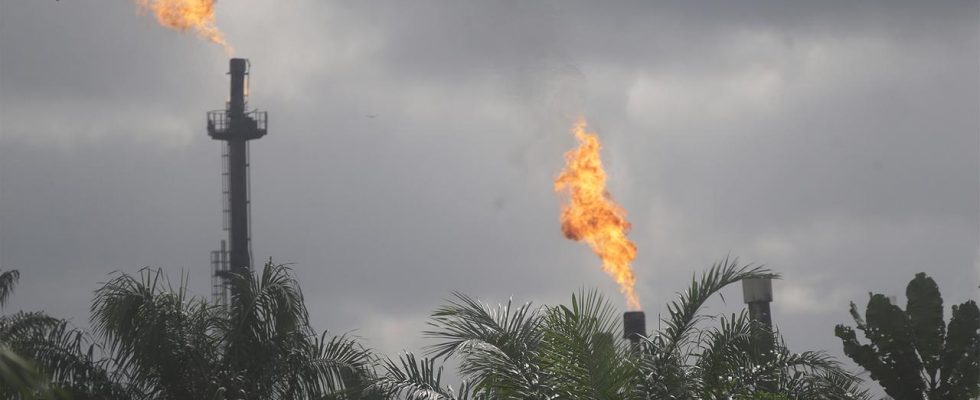For the first time, Germany wants to purchase natural gas directly from Nigeria. This import business was initiated by Frank Otto. The curious thing: The Hamburg entrepreneur has been committed to global climate protection for years.
“It’s all a joke,” says Nnimmo Bassey from Nigeria, commenting on what’s going on in his country. In 2010 he received the Alternative Nobel Prize for determining the costs of oil production to humanity based on the expected environmental consequences. Now he is watching new gas fields being developed in Nigeria in addition to the existing oil fields. A German company wants to use one of these fields: Hamburg-based Johannes Schütze AG.
The Hamburg entrepreneur Frank Otto initiated the gas business as a board member of Schütze Vertriebs AG. German municipal utilities are to be supplied with natural gas from Nigeria for twelve years. It’s a trading volume of five billion euros. The contract should be signed imminently, according to Schütze AG.
Support from Olaf Scholz
Otto says that some time ago he spoke to Federal Chancellor Olaf Scholz about his plans to purchase gas from Nigeria. He then discussed this on his trip to Nigeria last fall. In fact, Scholz announced an energy partnership with Nigeria in 2023, which would involve the purchase of gas and hydrogen.
The Chancellery told the crowd Plus minus with, the federal government is currently not financially supporting Schütze AG’s gas business. Johannes Schütze is still satisfied: “If Mr. Scholz says we are flying to Nigeria and looking for gas, then that is also politically desired and I am happy about it.”
The green one Selling point
Schütze AG’s planned gas import is intended to protect people in the Nigerian production areas and the climate. The aim is to use accompanying gas that comes to the surface during oil production and has so far often simply been flared off, according to Johannes Schütze AG. This reduces the breathing problems of people in the Nigerian production areas, says Nigerian exporter David Ige. He is the manager of the company Riverside LNG, which will organize the gas in Nigeria.
But Ige points out that accompanying petroleum gas alone cannot ensure a stable supply. He expects that associated gas from oil production can initially be used for 30 percent of the agreed amount. Later the proportion will probably fall to 15 to 20 percent. At least 70 percent of the gas for Schütze AG will therefore come from a newly created gas production field.
This is in the interests of the local people, says entrepreneur Otto, justifying the gas business. After all, we work with entrepreneurs and investors from Nigeria: “And they keep a very close eye on the needs and concerns of the population.”
disappointment and Resource Curse
The alternative Nobel Prize winner Bassey is deeply disappointed that German investors are launching new gas projects in Nigeria. It is not in the interests of African countries if the earth continues to heat up. The lives of many people are already threatened by persistent droughts and heavy rain events.
Franziska Holz from the German Institute for Economic Research has spent the past few months intensively studying the conditions for oil and gas production in Nigeria. She also takes a critical view of Schütze AG’s gas business. For economists, Nigeria is a classic example of the so-called “resource curse”.
The country’s wealth of resources has led to a one-sided dependence on oil and gas and to a low standard of living for the population. And at the same time there is widespread corruption and the enrichment of a few elites. It is regrettable that German importers continue to support the situation in a country with these structural problems. There is obviously also a lack of strategic support from the German federal government in order to trigger structural changes in Nigeria.
Sad record
Last year, CO2 emissions from fossil fuels were higher than ever before. In Nigeria and Russia, a particularly large amount of methane escapes from oil and natural gas production fields. This is what satellite images show.
In Siberia, the German company Wintershall Dea worked together with the Russian state-owned company Gazprom to produce gas. As a minority shareholder, the Russian side was only able to influence to a limited extent to reduce the escape of climate-damaging gas, according to Wintershall Dea’s parent company BASF. The environmental report from a jointly operated production field in Siberia shows that the methane escaping from plant components in one year alone will cause global environmental damage of 756 million euros, which current and future generations will have to pay.
What was problematic during production in Russia together with Gazprom could now be repeated through the development of new gas fields in Nigeria. Nigeria is a country where violations of environmental law are rarely punished. Flaring associated gas from oil production, for example, has been illegal since 1984. Nevertheless, the torches still burn today.

